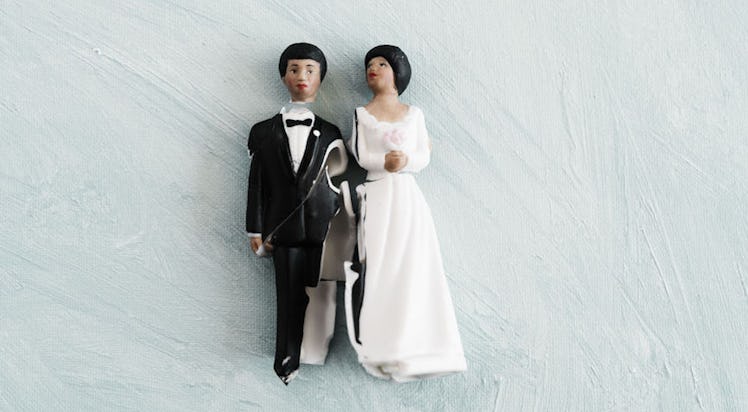
Here’s Why People Are Allowed To Object At Weddings, Because This Tradition Is Confusing
Once a couple has decided to tie the knot, it's almost guaranteed they're going to get bogged down by the seemingly endless list of worries related to planning their upcoming wedding. But, assuming they've both been completely honest with each other, a guest (invited or otherwise) going rogue and objecting mid-ceremony hopefully won't be a concern. Which begs the question: Why are people allowed to object at weddings, anyway? (Because it's obviously rude AF.) Well, the truth is that, shockingly, this archaic tradition actually used to make some sense.
"If anyone can show just cause why this couple cannot lawfully be joined together in matrimony, let them speak now or forever hold their peace," has been the cue for any of the bride or groom's past skeletons to come cascading out of the closet prior to an official Christian wedding ceremony for centuries. According to Grammarist, offering the opportunity for someone to object during a ceremony began in Medieval times as a safeguard against any "unlawful" marriages.
At the time, Christian townsfolk were given three days to come forward with any reason why a couple shouldn't be allowed to go through with an upcoming wedding. According to the same website, more often than not, objections were made because a groom was already married to someone else. As a final opportunity to speak up, the phrase was added to the ceremonial process to encourage any and all sketchiness to come to light before it was too late.
Now, seeing as more and more millennials are waiting longer to get married and young people are dating around way more now than they were in Medieval times, it's understandable why a bride or groom might be low-key on edge about someone from their past ruining the best day of their life with a dramatically-timed objection. But even, though an ex showing up to a wedding ready to profess their love and shut down the whole operation might sound like something that's somewhat possible, it's probably not going to happen. Luckily, in this day and age, an objection would need to be legally substantiated.
"You can't object simply because you're in love with the bride. It has to be a legal reason why the couple can't wed," New York City-based officiant Paula Posman told Live Science. "But today, the legal aspects of a wedding are squared away before the couple gets to the altar, so most officiants just don't ask the question."
Whew, well that's good news. Assuming neither party is up to anything questionable, at the end of the day, a marriage shouldn't be anyone's business but that of the two people involved. However, there are still situations where people have, in fact, decided to object during a ceremony, and these situations are just as awkward as you'd imagine. Ultimately, wedding traditions have continued to evolve over time and barriers of protection (like giving attendees an opportunity to question the legality of a wedding) have become obsolete. But, I mean, if there's a reality TV show in the works about surprise wedding objections, I wouldn't not watch it.